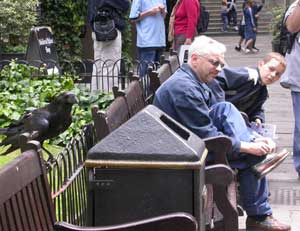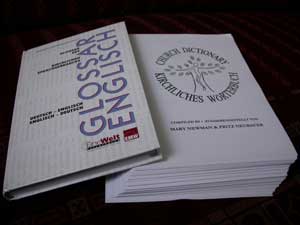Sometimes I think the sorting of rubbish has gone too far in this country.


Sometimes I think the sorting of rubbish has gone too far in this country.

Urheberrechtsverletzung bei Online-Wörterbüchern? Open-Source-Wörterbuch mit vielen Beitragenden wurde anscheinend ohne Quellenangabe übernommen.
There are a number of bilingual online dictionaries. I don’t use them often, but they can be useful. They are as good as the contributors, but I don’t take a suggested translation unless I know it’s OK anyway.
The most famous is LEO (DE>EN>DE here – it mow has over 400,000 terms). Sometimes when I search for a German word on Google, I am directed to a Leo page where contributors are discussing a term. For instance, they’re discussing Rechtspersönlichkeit at the moment.
The Kudoz glossaries at ProZ are also useful. As with everything, you have to be discriminating, but people give reasons for their suggestions and that helps decide who to trust.
Almost as famous as Leo is dict.cc. I had a look at the page on Urteil. There are several solutions, starting with adjudgement, a word I don’t think I’ve ever used in my life. There’s no information to distinguish the use of judgment, decision, decree and verdict, nor any comment on the two spellings of judg(e)ment.
While browsing the dictionary I came across this page (German) describing an apparent theft of the dictionary as a whole.
Meanwhile, Frenetica fannullona reports a new online dictionary, woerterbuch.info, with translation and synonym search. That too gives adjudgement, among other terms. Here’s a German article from Austria announcing the dictionary.
The New York Daily News reports that Monica Lewinsky was thinking of becoming a lawyer, but instead wants to study forensic psychology.
bq. Monica Lewinsky is exploring the insanity defense.
bq. The former White House intern and handbag designer had been thinking about applying to law school. But she now wants to study forensic psychology at the John Jay College of Criminal Justice. …
bq. “Forensic psychology combines my interest in psychology with my interest in law,” Lewinsky, who hopes to start the grad program in January, told Webster Hall’s Baird Jones.
(Via Notes from the (Legal) Underground, who had it from Wonkette)
I’ve borrowed the following graphic (click to enlarge) of weblog hierarchy from Tom Reynolds of Random Acts of Reality.
It’s very impressive. I suppose one can exist on a certain level of each column. There should be something between Dreamweaver and Movable Type, though, because nowadays I look down on myself for using MT, but whether it should be WordPress I can’t decide.
I feel, however, that I should add a little cat content at this point. This is Tom.
In seinem deutschen Weblog bespricht Dr. Karl-Friedrich Lenz IPKAT’s Überlegung, ob der Neubau von Teilen der Mauer eine Urheberrechtsverletzung darstellt.
Some time ago IPKAT speculated on the intellectual property law aspect of rebuilding a section of the Berlin Wall.
bq. The IPKat wonders whether there is an issue in Germany of copyright infringement, as there may well be in the UK. Under the Copyright, Designs and Patents Act 1988, section 4, the Berlin Wall would be a “building or a model for a building” which would attract death-plus-70 years copyright protection as an artistic work. The only issue would be whether the rebuilding of a mere 200 yard section of the 96-mile wall would count as the copying of a “substantial part” of the original wall for infringement purposes.
Dr. Karl-Friedrich Lenz, who has blogs in English, German and Japanese, has researched the matter in German law. His English entry is brief. German sources differ as to the copyright position of unlawful works.
Chief Justice William Rehnquist wurde Samstag wegen Schilddrüsenkrebs operiert. Er soll am 1. November wieder im Gericht sein. Es wird natürlich besprochen, wie es angesichts der kommenden Wahl um einen eventuellen Nachfolger bestellt werden könnte.
bq. Rehnquist Hospitalized for Treatment of Thyroid Cancer
(Tony Mauro, Legal Times, 10-25-2004)
bq. Chief Justice William Rehnquist expects to be on the bench when the Supreme Court convenes again Nov. 1, in spite of surgery on Saturday in connection with a recently diagnosed case of thyroid cancer.
bq. The surprise announcement of Rehnquist’s illness and surgery came just before noon today, and raised in a concrete way an issue that has been an abstraction during the presidential campaign: the possibility of a departure from the Supreme Court in the near future.
LATER NOTE: Q & A on the situation at SCOTUSBlog; also report of illness.
Here are some photos of ravens at the Tower of London, taken in June. They would rather be frightened off a mountain by Trevor, I’m sure. You’re not supposed to feed them, but they don’t know that.
That’s a juvenile starling in the top picture.
They are called an unkindness of ravens (as opposed to a murder of crows), as we learnt at junior school.
LATER NOTE: In the comments, Abnu informs me of a post on the subject of collective nouns with further links.



Wortfeld gibt die Auswahlliste für Titel wieder, die bei der Bestellung von Spiegel online erscheint (allerdings verdoppelt).
Wortfeld reproduces (with some repetitions) a list of titles you can choose from if you want to try out the Spiegel Online e-paper:
You can be Prof. Dr. Dr., but not just plain Dr. Dr. You can be Mr. but not Ms. (to say nothing of dropping the full stop). Frau seems to be missing too.
The Observer reports that Mongolia is introducing last names in order to be able to use a telephone book. But too many of them named themselves after Genghis Khan (that’s what I would have chosen myself too). The 1997 surnames law was ignored till an ID card system was introduced recently.
I seem to recall a similar problem existing in Iceland.
bq. Icelanders have a given name, plus the name of (usually) their father with an attached “-son” for boys and “-dóttir” for girls. So, Jón’s son Gunnar is called Gunnar Jónsson, and his daughter Njóla is called Njóla Jónsdóttir. Because of this lack of family names, telephone directories are arranged by given names – using the above example, you’d find Gunnar Jónsson under “G”, and Njóla Jónsdóttir under “N” in the phone book. In an effort to preserve national identity, all foreigners taking Icelandic citizenship must also take an Icelandic name.
Don’t know if David stayed in Iceland long enough to look at a phone book.

Here are two glossaries of terminology relating to the church.
The one on the left is a traditional alphabetically arranged one in book form: Maureen und Reinhold Trott, Glossar des kirchlichen Sprachgebrauchs Deutsch-Englisch, Englisch-Deutsch, Missionshilfe Verlag, Hamburg 2001, ISBN 3-921620-96-1
Maureen Trott was a translator and responsible for Engish at the office of the Evangelisches Missionswerk in Deutschland (EMW). I see there is a revised and expanded second edition, 224 pages long. It costs 5.50 euros (but even less if you buy ten!). It’s good and reliable.
On the right is Church Dictionary / Kirchliches Wörterbuch, compiled by Mary Newman and Fritz Neubauer, 1st ed. May 2003, no ISBN
Further copies can be obtained from:
The European Secretary
Council for Christian Unity
Church House
Great Smith Street
London SW1P 3NZ
You can get it in Germany for 15 euros using the form I have scanned here:
The dictionary is a loose-leaf resource which will be updated from time to time. It is not alphabetically arranged, but under themes: the broader themes are Bible
Biblical/Theological Concepts
Church Buildings
Christian Year
The Church Institution
Home and Family
Parish
Religious Movements
Rites and Services
There are many more sub-themes, though. It would be easy to scan, and probably best in electronic form; it would still be possible to select parts and print out those needed, for instance by an interpreter. It looks good too.
There must be other glossaries of this kind around, I can’t help thinking, known inside the churches that produce them but not to the wider bookbuying public.